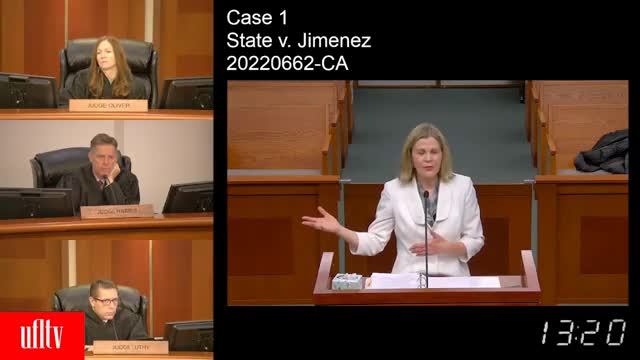Court hears arguments on molestation claims in Jimenez trial
May 24, 2025 | Utah Appellate Court Collection, Utah Family Law District Court Collection, Utah District Courts, Utah Judicial Branch, Utah
This article was created by AI summarizing key points discussed. AI makes mistakes, so for full details and context, please refer to the video of the full meeting. Please report any errors so we can fix them. Report an error »

In a recent court session regarding the case of State v. Jimenez, significant discussions emerged surrounding the handling of sensitive testimony related to allegations of molestation. The state argued that the defense counsel had effectively waived objections to a letter containing various traumatic statements by indicating no objection, except for the specific mention of molestation by the defendant's stepfather.
This pivotal moment in the hearing highlighted the complexities of legal strategy in cases involving sensitive topics. The defense's focus on the molestation claim, while seemingly dismissing other traumatic experiences described in the letter, raised questions about the implications for the case. The defense appeared to be strategically positioning itself to suggest alternative explanations for the victim's emotional and psychological distress, rather than solely attributing it to the alleged molestation.
The discussions revealed a deeper concern about how trauma is presented in court and the potential impact on the jury's perception. The defense's decision not to object to other inflammatory statements could be seen as a calculated move to leverage the broader context of the victim's experiences in their closing arguments.
As the case progresses, the community remains attentive to how these legal strategies will unfold and what they mean for the individuals involved. The outcome of this case could have lasting implications not only for the parties directly involved but also for how similar cases are approached in the future. The court's handling of sensitive testimony will be crucial in ensuring justice while also considering the emotional weight of such allegations.
This pivotal moment in the hearing highlighted the complexities of legal strategy in cases involving sensitive topics. The defense's focus on the molestation claim, while seemingly dismissing other traumatic experiences described in the letter, raised questions about the implications for the case. The defense appeared to be strategically positioning itself to suggest alternative explanations for the victim's emotional and psychological distress, rather than solely attributing it to the alleged molestation.
The discussions revealed a deeper concern about how trauma is presented in court and the potential impact on the jury's perception. The defense's decision not to object to other inflammatory statements could be seen as a calculated move to leverage the broader context of the victim's experiences in their closing arguments.
As the case progresses, the community remains attentive to how these legal strategies will unfold and what they mean for the individuals involved. The outcome of this case could have lasting implications not only for the parties directly involved but also for how similar cases are approached in the future. The court's handling of sensitive testimony will be crucial in ensuring justice while also considering the emotional weight of such allegations.
View full meeting
This article is based on a recent meeting—watch the full video and explore the complete transcript for deeper insights into the discussion.
View full meeting

